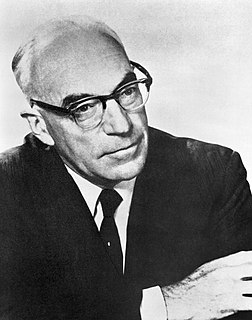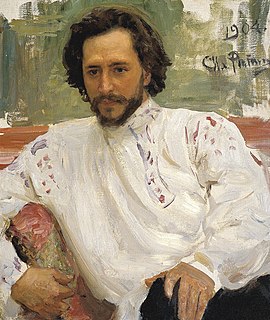A Quote by Peace Pilgrim
You might say that science operates pragmatically and religion by divine guidance. If valid, they would reach the same conclusions but science would take a lot longer.
Related Quotes
Science is like society and trade, in resting at bottom upon a basis of faith. There are some things here, too, that we can not prove, otherwise there would be nothing we can prove. Science is busy with the hither-end of things, not the thither-end. It is a mistake to contrast religion and science in this respect, and to think of religion as taking everything for granted, and science as doing only clean work, and having all the loose ends gathered up and tucked in. We never reach the roots of things in science more than in religion.
Science and religion are very much alike. Both are imaginative and creative aspects of the human mind. The appearance of a conflict is a result of ignorance. We come to exist through a divine act. That divine guidance is a theme throughout our life; at our death the brain goes, but that divine guidance and love continues. Each of us is a unique, conscious being, a divine creation. It is the religious view. It is the only view consistent with all the evidence.
This [the opening of the Vatican City radio station built by Marconi earlier in 1931] was a new demonstration of the harmony between science and religion that each fresh conquest of science ever more luminously confirms, so that one may say that those who speak of the incompatibility of science and religion either make science say that which it never said or make religion say that which it never taught.
Someone with a fresh mind, one not conditioned by upbringing and environment, would doubtless look at science and the powerful reductionism that it inspires as overwhelmingly the better mode of understanding the world, and would doubtless scorn religion as sentimental wishful thinking. Would not that same uncluttered mind also see the attempts to reconcile science and religion by disparaging the reduction of the complex to the simple as attempts guided by muddle-headed sentiment and intellectually dishonest emotion?
But science can only be created by those who are thoroughly imbued with the aspiration toward truth and understanding. This source of feeling, however, springs from the sphere of religion. To this there also belongs the faith in the possibility that the regulations valid for the world of existence are rational, that is, comprehensible to reason. I cannot conceive of a genuine scientist without that profound faith. The situation may be expressed by an image: science without religion is lame, religion without science is blind.
I would teach how science works as much as I would teach what science knows. I would assert (given that essentially, everyone will learn to read) that science literacy is the most important kind of literacy they can take into the 21st century. I would undervalue grades based on knowing things and find ways to reward curiosity. In the end, it's the people who are curious who change the world.
Because a fact seems strange to you, you conclude that it is not one. ... All science, however, commences by being strange. Science is successive. It goes from one wonder to another. It mounts by a ladder. The science of to-day would seem extravagant to the science of a former time. Ptolemy would believe Newton mad.





































